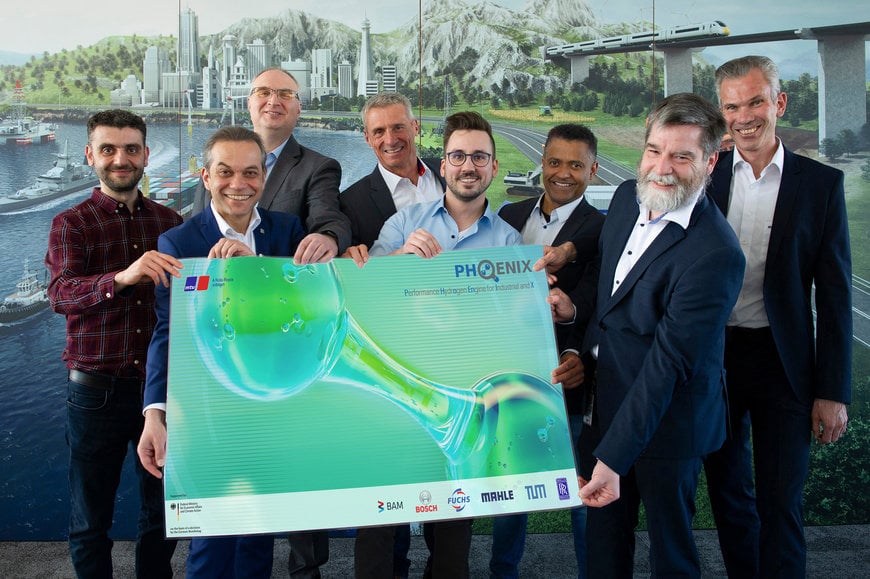www.industryemea.com
25
'24
Written on Modified on
MTU: ROLLS-ROYCE COLLABORATES WITH TECHNOLOGY PARTNERS ON HIGHLY EFFICIENT HYDROGEN ENGINE FOR STATIONARY POWER GENERATION
Under the Phoenix project, the consortium aims to generate the same electrical and thermal energy as currently available through natural gas CHP units in the higher power range of up to 2.5 MW.
www.mtu-solutions.com

In the picture from left to right the members of the R & D project PHOENIX: Dr Enis Askar (BAM), Dr Daniel Chatterjee (RR), Jürgen Rausch (FUCHS), Dr Kurt Schrattbauer (Bosch AG), Tomas Bartkowski (RR), Junio Reis de Souza (Project Management Jülich), Dr Maximilian Prager (TUM), Tobias Grieble (MAHLE)
Rolls-Royce has started, with a consortium of five companies and research institutes, to develop the necessary technologies for a highly efficient first-of-a-kind hydrogen combustion engine to drive combined heat and power (CHP) systems. Under the Phoenix (Performance Hydrogen Engine for Industrial and X) project, funded by the German Government, the consortium aims to generate the same electrical and thermal energy (power density and efficiency) as currently available through natural gas CHP units in the higher power range of up to 2.5 MW. When fuelled by green hydrogen, this next-generation stationary energy plant will be able to run in a completely carbon-neutral manner. The project is being funded by the German Federal Ministry for Economic Affairs and Climate Protection with a total of almost five million euros.
“We are convinced that combustion engines will remain an essential part of the provision of a reliable energy supply during the energy transition,” said Dr Jörg Stratmann, CEO of Rolls-Royce Power Systems. “We are making them climate-friendly with sustainable fuels. That's why we at Rolls-Royce are investing in the development of next-generation hydrogen engines. The consortium in the Phoenix project, with its combined expertise, is a guarantee of success in tackling this major technical challenge.”
Rolls-Royce has already developed a gas-powered combustion mtu engine that can use hydrogen as fuel, but the Phoenix project will develop the technology for an even more efficient next-generation hydrogen engine. Hydrogen is one of several alternative fuels being used by Rolls-Royce to make its engine portfolio more sustainable. It is making its portfolio of reciprocating mtu engines compatible with alternative fuels such as hydrotreated vegetable oil (HVO) and e-fuels, and it is heavily involved in exploring the use of methanol for marine applications.
The participants in the Phoenix project are developing the necessary components for a first-of-a-kind hydrogen combustion engine, such as the injection system, the piston group and the ignition system, as well as a completely new lubricant. The partners in the project are: Rolls-Royce as coordinator; the Institute for sustainable mobile propulsion systems at the Technical University of Munich; MAHLE Konzern; Fuchs Lubricants Germany GmbH; the German Federal Institute for Materials Research and Testing (BAM); and Robert Bosch AG.
The joint project is scheduled to run for three years. By then, a technology concept will have been developed that is sufficiently mature for use in a complete prototype engine.
Rolls-Royce has started, with a consortium of five companies and research institutes, to develop the necessary technologies for a highly efficient first-of-a-kind hydrogen combustion engine to drive combined heat and power (CHP) systems. Under the Phoenix (Performance Hydrogen Engine for Industrial and X) project, funded by the German Government, the consortium aims to generate the same electrical and thermal energy (power density and efficiency) as currently available through natural gas CHP units in the higher power range of up to 2.5 MW. When fuelled by green hydrogen, this next-generation stationary energy plant will be able to run in a completely carbon-neutral manner. The project is being funded by the German Federal Ministry for Economic Affairs and Climate Protection with a total of almost five million euros.
“We are convinced that combustion engines will remain an essential part of the provision of a reliable energy supply during the energy transition,” said Dr Jörg Stratmann, CEO of Rolls-Royce Power Systems. “We are making them climate-friendly with sustainable fuels. That's why we at Rolls-Royce are investing in the development of next-generation hydrogen engines. The consortium in the Phoenix project, with its combined expertise, is a guarantee of success in tackling this major technical challenge.”
Rolls-Royce has already developed a gas-powered combustion mtu engine that can use hydrogen as fuel, but the Phoenix project will develop the technology for an even more efficient next-generation hydrogen engine. Hydrogen is one of several alternative fuels being used by Rolls-Royce to make its engine portfolio more sustainable. It is making its portfolio of reciprocating mtu engines compatible with alternative fuels such as hydrotreated vegetable oil (HVO) and e-fuels, and it is heavily involved in exploring the use of methanol for marine applications.
The participants in the Phoenix project are developing the necessary components for a first-of-a-kind hydrogen combustion engine, such as the injection system, the piston group and the ignition system, as well as a completely new lubricant. The partners in the project are: Rolls-Royce as coordinator; the Institute for sustainable mobile propulsion systems at the Technical University of Munich; MAHLE Konzern; Fuchs Lubricants Germany GmbH; the German Federal Institute for Materials Research and Testing (BAM); and Robert Bosch AG.
The joint project is scheduled to run for three years. By then, a technology concept will have been developed that is sufficiently mature for use in a complete prototype engine.
www.mtu-solutions.com

